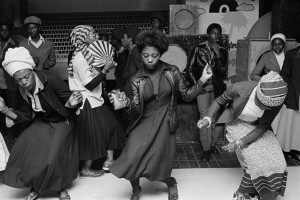
Disco, Wolverhampton, West Midlands, England 1978 (Photograph by Chris Steele-Perkins)
What does the Black Atlantic sound like? Depending on where you are, it could sound like Reggae, Zouk, Highlife, Jazz, Salsa, the Blues, Hip-Hop, Northern Soul, or Samba. Paul Gilroy writes in The Black Atlantic that “the times are always contained in the rhythm.” [1] This is only part of the story. Sound is one representation of the zeitgeist, but place is deeply embedded in the rhythms that make up music. The syncopation of the Cuban son, the polyrhythmic percussion of Ghana, the brassy brightness of Nigerian Afro-beat, and the fast-paced, intricate improvisations of New York’s bebop connect listeners and players alike in ways that span time and space.
We are interested in understanding the role that sound has played in shaping, defining, and constructing the idea of the Black Atlantic as a historical space. Building primarily from Paul Gilroy’s discussion of black music, this site is also interested in connecting sounds that do not appear in his analysis, especially from Francophone traditions in Europe and Africa. By exploring the genealogies of sound through an analysis of music, we look deeper into the relationship between time and space in the Black Atlantic. The deliberate construction of music from familiar and unfamiliar sounds, as a set of choices that have historical and social meaning, suggests that music provides an ideal form for this kind of analysis.
In Modern Blackness, Deborah Thomas describes the Jamaicans of an unnamed hill community outside Kingston as being “intensely aware of their relationship to a changing global political economy.” Modern music is one of the ways in which people recognize their relationship to the larger world. The affective nature of music means that for Gilroy, “black music provided me with the means to gain proximity to the sources of feeling from which our local conceptions of blackness were assembled.” Sound, and music, informs our sense of place and our relationship to the past. It also connects us to the present and addresses the cultural dislocation of migration, economic deprivation, structural inequality, and panoply of histories that can reside under the rubric of the Black Atlantic.
Menu:
The Political Imaginaries of Black Atlantic Cultural Creation
Mapping the Black Atlantic Through Samples
The Francophone Atlantic as Musical Testimony for Modern History
like the idea of the black culture and would like to know more and move on to developing this connecting the we have lose throughout the years